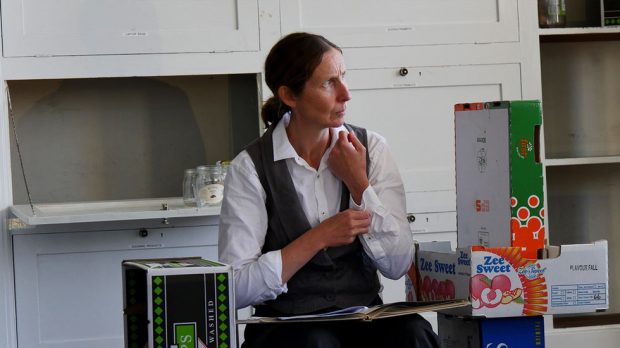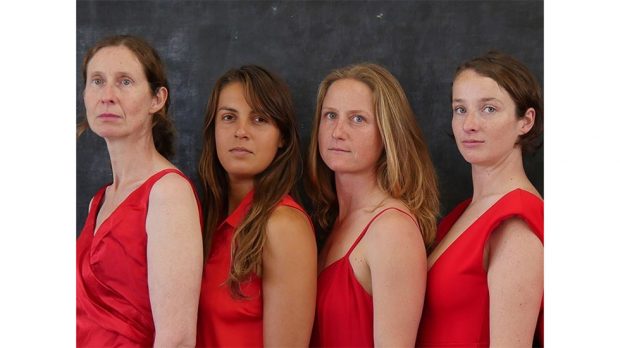
Existence Theatre, the duo of Elisabeth M Eitelberger and Bello Benischauer, have been challenging audiences for 20 years with their peculiar brand of confrontational and thought provoking theatre. This year at FRINGE WORLD, they bring two productions which will encourage audiences to think and change. Both are being brought to the gorgeous surrounds of Girls School, a fantastic venue on Wellington Street which is definitely worth a visit. Even better? If you see one of their shows, you get a discount to the second on checkout! NATALIE GILES had a chat with Eitelberger about their two shows, Stormwater, showing from January 17 – 25 and Lonely Mars from February 10 -16.
You have been working together for 20 years! How does that work? Surely you have creative differences…
We are like yin and yang and there is a lot of conflict situations. It is a matter of how to use the creative energy and idealism of two people to make the most of it, which is not easy but our beliefs and values are the same. Our projects are based on Bello’s ideas and concepts and his productive drive. While he focuses on writing, sound creation, directing and video projection, I manage the theory around our methodologies, organisational things and work alongside other performers in recent years, with which I also work individually to prepare them for their performative presence.
You have two shows running at Perth Girls School this year after previously utilising it. What do you love about the venue?
It was a great honour to be able to develop onsite for the past months as part of the FRINGE WORLD R&D Programme. Bello and me, both being born in Austria, we have a love for heritage buildings and Girls School is for sure a place with history. For us, working with the energy of a space plays an important part to bring a project alive.
While Stormwater digs into unpleasant memories of what past decisions have done to the people involved, Lonely Mars questions the unreasonable drive for extending exploiting intentions by bringing the human being and its primal needs and hopes into the focus. With both projects “growing” at Girls School, we could feel how the place affected and helped to form the performative components.
Both of your shows cover socio-cultural issues, including gender, power and oppression. What do you hope audiences take from your shows? What do you think are the most pertinent and urgent issues facing us today?

In our work we always address exploitation on different levels, and this concerns gender as well as capitalism. Climate Change is real. Human ignorance is real. Racism is real. Jemma Fleming and I play trouser roles in Stormwater. This also brings female masculinity as performance and feminism into the focus and examines critically the general expectations that exist around the term female and male in society. There is no black and white in reality, and gender issues go way beyond sexual orientation and most importantly they concern everyone.
In Stormwater we speak about the terms in use to define particular groups of people. Do we really need to label so that others come and stigmatise? Existence Theatre productions ask a lot of questions and challenge people rather than to provide trivial answers. We provoke our audience to make up their own mind, to think about it, to form their own opinion.
One of your productions, Stormwater, is end of world, nigh apocalyptic. Isn’t that pretty dark subject matter?
We don’t see ourselves as entertainers alone, we believe in art that presents a different and critical view so that people may change their perception on things, so that they might see something that they didn’t see before. This is also why the concept of Existence Theatre works with ripping down the fourth wall, we include the audience, they are not spectators alone, they are in the story, they are in the middle of conflicts and they can show their response directly to the performer. They can switch from witness to ally.
We don’t show people a love story without the hurdles, the complications. We show the impact that problems can cause, we dig deep into the human psyche. In Stormwater we talk about the fears surrounding the idea of the end of the world. And people have all sorts of visions about this. We address all this not without humour, but surreal and sometimes cynical for sure.

Lonely Mars is presented in eight languages! How do you manage that?
One of our biggest concerns is how people get treated differently and how big racism is in our world. We live in Australia, a place of many races and nations. So we use this opportunity to get people from different backgrounds together. Language is a good trigger to confront someone with own barriers and judgemental behaviours.
Even if language makes such a small percentage in our human communication, it has huge effect and impact. So we invite the performers that we work with to make use of their other languages to raise awareness of the abundance of differences that lead to great variety and also to lead our audiences away from focusing on the understood words to appreciate the unique sound of the individual languages. Performers speak simultaneously and sometimes only direct the words to a small group of the audience. It is not relevant to understand everything that is said. People are encouraged to let the whole experience sink into their system.
Audience participation is really polarising stuff – is it required in Lonely Mars?
This may be a difference to others who use audience participation. Existence Theatre productions do not mean to polarise, we mean to include and to unite. Our audience sits very close, they can face each other, they touch each other, all get involved in the actions, no one is excluded or selected out of the group. This participation is also never meant to shock.
It is part of the performers’ training period to be able to pick up on energy flow, pick up on vibes and how to approach someone so that they do not feel exposed. Maybe it is like that, we don’t move the crowd, the crowd moves us. Even if there is a formed concept, every performance is different and we react to the audience members, who are present. We use the energy that the people bring into the space, like we use the energy of the space itself. But it is not what is called improvisation in theatre. To get ready to overstep the fourth wall in our style needs at least an intense half-year process of preparation for the performers.
Is audience participation required in Lonely Mars? Yes, of course! We are on the lookout for chosen ones, who will accompany us on our mission to preserve humanity, to keep human hope alive!
Why should Fringe goers choose your shows out of the 700 plus on offer?
Both shows are thought-provoking, site-specific and unconventional and probably unusual for Fringe goers. We unite performance in movement and spoken word with diving into a profound soundscape and projected visuals. We don’t fit into existing frameworks and as I said, audiences get a very unique and close-up experience. The way how we perform and interact, hits audiences very personally and emotionally. They all take their own individual story home. We call our practice Existence Theatre, because our work addresses existential questions that all people have at some point in their life and often not share openly. We speak out and encourage people to speak out too and most significantly to be open towards the other.
https://www.youtube.com/watch?v=3kfhOnrrqbY&feature=youtu.be
https://www.youtube.com/watch?v=t-sJZ0e9mw4&feature=youtu.be